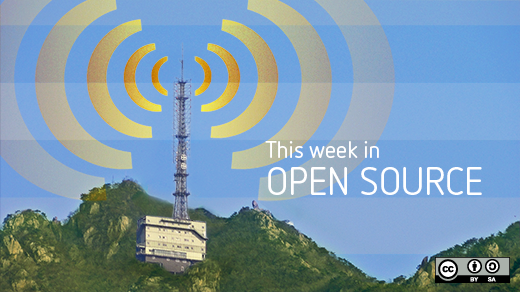In this week's edition of our open source news roundup, we take a look to websites blocked in India, the debut of open source-powered devices at the Consumer Electronics Show 2015, and more!
Open source news for your reading pleasure.
January 3 - 9, 2015
Consumer Electronics Show showcases devices powered by Linux and open source
The 2015 edition of the Consumer Electronics Show descended upon Las Vegas this week. And while Linux and open source haven't quite taken center stage at the event, devices powered by open technologies have made a splash.
A raft of smart TVs running Android and Tizen (and even one powered by Firefox OS) broke cover, Razer announced an an open source virtual reality development kit, and Linksys has served up an a wireless router running open source software. NVIDIA used Ubuntu to demo some of its latest wares. And, if that wasn't enough, Toyota open sourced its hydrogen fuel cell patents.
It remains to be seen whether or not any of this will gain traction in the marketplace. But it does highlight how Linux and open source underpin consumer technology.
India blocks 32 websites including GitHub, CodePad, and the Internet Archive
In a move that shocked many, and had repercussions for open source users and developers, India's Department of Telecom (DoT) ordered internet service providers to block access to 32 websites. Among those sites were GitHub, CodePad, the Internet Archive, which are widely used by open source enthusiasts in India.
An article by ZDNet quotes Arvind Gupta, national head of the ruling Bharatiya Janata Party, who stated that, "The websites that have been blocked were based on an advisory by Anti Terrorism Squad, and were carrying Anti India content from ISIS."
The wider issue is how easily governments can block access to websites they find offensive. TechCrunch points out that, "India’s government has long tried to censor entertainment sites which contain media that it deems 'unsuitable' for consumption in the country."
Since the news broke, the Indian government has lifted the block on GitHub, Vimeo, Dailymotion, Weebly, and Pastebin.
Art collections from the Freer and Sackler Galleries now available online
The Freer Gallery of Art and the Arthur M. Sackler Gallery have made 44,000 works of American and Asian art available online. The artwork, which is available as a set of high resolution scans, is free of copyright for non-commercial use.
This move makes the majority of the galleries' holdings, which were in storage or not on display, available to everyone. The Forbes article states, "Accompanying the digital photographs are records that provide the public with as much information as possible to further encourage research and creative use." But Courtney O’Callaghan, director of digital media and technology for the galleries, put it best by stating, "a new generation can not only appreciate these works on their own terms, but remix this content in ways we have yet to imagine."
AutoDesk unveils Project Wire
3D printing on the desktop is interesting, but it's restricted to smaller objects. That could change, thanks to AutoDesk's Project Wire electronics design software. Mated with a 3D printer from Voxel8, Project Wire "could potentially make circuit prototyping as easy as designing a 3D-printed figurine," VentureBeat reports.
At the moment, the developer's kit from Voxel8 (which includes a 3D printer and materials) will set you back $8,999 (USD). According to the Voxel8 website, this rig enables "customized electronic devices like quadcopters, electromagnets and fully functional 3D electromechanical assemblies."
Open source has won, but there's still more to do
In an article by Glynn Moody at ComputerWorld UK, he points out how pervasive open source is in the world of technology—from supercomputers, cloud computing, web servers, mobile devices, embedded systems, and the Internet of Things. Open source underpins much of what we do, both online and off.
But, Moody writes, "this level of success always begs the question: where do we go from here?" He points out that while open source has won, its power lies in its constant evolution and its ability to outshine its closed source rivals. Moody concludes that, "whatever amazing free software 2014 has already brought us, we can be sure that 2015 will be full of yet more of it."
In other news
- Open source carried forward software-defined storage
- How copyright makes culture disappear
- Is open source collaboration the key to better communication?
- The goverment of Quebec writes three new open source licenses
- MongoDB set to gain momentum in 2015
A big thanks, as always, to the Opensource.com moderators and staff for their help this week.







Comments are closed.